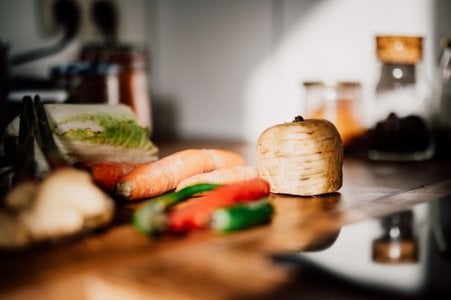Discover the Surprising Vegetable a Dietitian Swears By for Rapid Weight Loss!
By
Seia Ibanez
- Replies 3
In the ever-evolving landscape of health and nutrition, where every day seems to bring a new superfood or weight loss miracle, it's easy to get lost in the noise. But sometimes, the most effective advice is the simplest and most timeless: eat your vegetables. It's a mantra that's been echoed by parents and health experts alike, and for good reason. Vegetables are not just a cornerstone of a healthy diet; they're also a powerful ally in the battle against the bulge.
As we navigate the golden years, managing our weight becomes even more crucial for maintaining overall health and reducing the risk of chronic diseases. But with so many diets and food trends vying for our attention, it's important to focus on what truly works. According to a dietitian's expert opinion, the key to weight loss isn't found in a trendy diet or a single miracle vegetable. Instead, it's about embracing a variety of vegetables that you love and will consistently eat.
Why Vegetables Are Your Best Friend for Weight Loss
Vegetables are the unsung heroes of weight loss. They're low in calories, high in fiber, and brimming with essential nutrients and antioxidants. These qualities make them an ideal food for shedding unwanted pounds and maintaining a healthy weight. The fiber in vegetables, in particular, plays a significant role in weight management. It adds bulk to your meals, helping you feel full and satisfied without contributing extra calories. Moreover, fiber aids in digestion and can help regulate blood sugar levels, preventing those all-too-familiar hunger pangs.
The Science Behind Vegetables and Weight Loss
The evidence supporting the role of vegetables in weight loss is robust. Research consistently shows that individuals who consume a diet rich in vegetables tend to have lower body weights. For instance, a 2020 review published in Nutrients highlighted that increased fruit and vegetable consumption is a significant factor in women's weight loss. Another study, a 2019 meta-analysis in Advances in Nutrition, found that people who ate more vegetables had a 22% lower risk of long-term weight gain.
The Best Vegetable for Weight Loss: The One You'll Eat
Now, you might be wondering which specific vegetable is the dietitian's top pick for weight loss. The answer might surprise you: it's not about singling out one vegetable but rather embracing the ones you enjoy the most. Every vegetable has nutritional value, and the best one for weight loss is the one you will consistently incorporate into your diet.
Making Vegetables a Delicious Part of Your Diet
It's human nature to gravitate towards foods that taste good. So, if you love your veggies with a touch of butter, a sprinkle of cheese, or a drizzle of dressing, go ahead and indulge (in moderation, of course). Adding a bit of fat to your vegetables can enhance their flavor and increase your likelihood of eating them. Plus, fats can help your body absorb fat-soluble vitamins found in vegetables, such as vitamins A, E, and K.
Sustainable Changes for Long-Term Success
The secret to successful weight loss isn't in drastic diet overhauls but in making small, sustainable changes. Adding an extra serving of vegetables to your meals or substituting high-calorie foods with veggies are examples of simple adjustments that can have a significant impact over time.
The Bottom Line
The journey to weight loss and better health doesn't have to be complicated or restrictive. By focusing on consuming a variety of vegetables that you enjoy, you can create a diet that's both satisfying and effective for weight loss. Remember, the best vegetable for weight loss is the one you'll eat, so fill your plate with the colorful, flavorful veggies you love and reap the benefits of a healthier, lighter you.

Dear readers, we'd love to hear from you! What are your favorite vegetables to include in your diet, and how do you like to prepare them? Share your tips and experiences in the comments below, and let's inspire each other to enjoy our veggies and achieve our health goals together!
As we navigate the golden years, managing our weight becomes even more crucial for maintaining overall health and reducing the risk of chronic diseases. But with so many diets and food trends vying for our attention, it's important to focus on what truly works. According to a dietitian's expert opinion, the key to weight loss isn't found in a trendy diet or a single miracle vegetable. Instead, it's about embracing a variety of vegetables that you love and will consistently eat.
Why Vegetables Are Your Best Friend for Weight Loss
Vegetables are the unsung heroes of weight loss. They're low in calories, high in fiber, and brimming with essential nutrients and antioxidants. These qualities make them an ideal food for shedding unwanted pounds and maintaining a healthy weight. The fiber in vegetables, in particular, plays a significant role in weight management. It adds bulk to your meals, helping you feel full and satisfied without contributing extra calories. Moreover, fiber aids in digestion and can help regulate blood sugar levels, preventing those all-too-familiar hunger pangs.
The Science Behind Vegetables and Weight Loss
The evidence supporting the role of vegetables in weight loss is robust. Research consistently shows that individuals who consume a diet rich in vegetables tend to have lower body weights. For instance, a 2020 review published in Nutrients highlighted that increased fruit and vegetable consumption is a significant factor in women's weight loss. Another study, a 2019 meta-analysis in Advances in Nutrition, found that people who ate more vegetables had a 22% lower risk of long-term weight gain.
The Best Vegetable for Weight Loss: The One You'll Eat
Now, you might be wondering which specific vegetable is the dietitian's top pick for weight loss. The answer might surprise you: it's not about singling out one vegetable but rather embracing the ones you enjoy the most. Every vegetable has nutritional value, and the best one for weight loss is the one you will consistently incorporate into your diet.
Making Vegetables a Delicious Part of Your Diet
It's human nature to gravitate towards foods that taste good. So, if you love your veggies with a touch of butter, a sprinkle of cheese, or a drizzle of dressing, go ahead and indulge (in moderation, of course). Adding a bit of fat to your vegetables can enhance their flavor and increase your likelihood of eating them. Plus, fats can help your body absorb fat-soluble vitamins found in vegetables, such as vitamins A, E, and K.
Sustainable Changes for Long-Term Success
The secret to successful weight loss isn't in drastic diet overhauls but in making small, sustainable changes. Adding an extra serving of vegetables to your meals or substituting high-calorie foods with veggies are examples of simple adjustments that can have a significant impact over time.
The Bottom Line
The journey to weight loss and better health doesn't have to be complicated or restrictive. By focusing on consuming a variety of vegetables that you enjoy, you can create a diet that's both satisfying and effective for weight loss. Remember, the best vegetable for weight loss is the one you'll eat, so fill your plate with the colorful, flavorful veggies you love and reap the benefits of a healthier, lighter you.
Key Takeaways
- Eating a variety of vegetables is crucial for weight loss and overall health, as they are low in calories, high in fibre, and provide a large volume of food.
- Sustainable weight management is more effective with small, maintainable dietary changes rather than drastic diet overhauls, such as adding an extra serving of vegetables or replacing higher-calorie foods with produce.
- The fibre content in vegetables not only helps to fill you up but also stabilises your appetite by causing a more gradual insulin response and stimulating the release of satiety hormones.
- The most effective vegetable for weight loss is the one you enjoy and will eat regularly, and it's okay to enhance vegetables with some fat for better flavour and vitamin absorption.
Dear readers, we'd love to hear from you! What are your favorite vegetables to include in your diet, and how do you like to prepare them? Share your tips and experiences in the comments below, and let's inspire each other to enjoy our veggies and achieve our health goals together!








